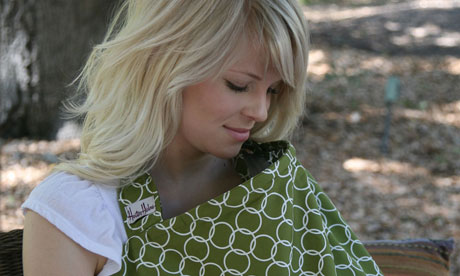
You don't have to look far for reminders that some people find breastfeeding problematic. A US Walmart store once refused to develop a photo of a three-month-old on the teat, and the deputy editor of Mother & Baby magazine in the UK recently wrote that, for her, the whole idea was a little creepy; she didn't want to put her "fun bags" in a "bawling baby's mouth".
Cue the rise of the "breastfeeding cover-up". The small ads in pregnancy magazines are suddenly full of these strange postnatal accessories, designed to shield onlookers from a supposedly offensive, unsolicited flash of lactating boob. Many of them are all-enveloping "nursing shawls" that make it look as if you are trying to smuggle a suitcase. The UK's Baby BuBu Breastfeeding Covers, for instance, are enormous body aprons, while the Bebe Au Lait Hooter Hiders Nursing Cover is a giant tent with a rigid neckline, allowing you to look down at your baby while wearing the maternal equivalent of clown trousers.
The growing popularity of these cover-ups is causing heated debate among those who think they are a brilliant idea, and those who see them as a giant step backwards. Julia Roberts, Gwen Stefani and Gwyneth Paltrow have all voiced support for Hooter Hiders; earlier this year it was suggested on the US TV show The View that a woman who had faced disapproval while breastfeeding in public could have saved herself the trouble by wearing a cover-up. In the British maternity press they are promoted unquestioningly in lists of the "best breastfeeding accessories".
Others are not so positive. Earlier this year, a Facebook group launched with the title: "If breastfeeding offends you, why don't you put a blanket over YOUR head?" It has more than 260,000 members. And Ina May Gaskin, the midwife and breastfeeding expert, says that "nipple-phobia" is a US problem that is now being exported worldwide.
Keira O'Mara, the 32-year-old entrepreneur behind Mamascarf – which allows a nursing baby to be cradled within a sling – says your view probably depends on how open you are about your body. A mother of two, she says that when breastfeeding her first baby, "I would find myself getting really flustered and feel like everybody was looking at me. But it was far more about my attitude to my body than it was about society's attitudes." Wearing the scarf reassured her that no one could see anything. Ex-Spice Girl Melanie C has used the cover-up with her daughter Scarlet, now one, on the basis that she "was very self-conscious about needing to breastfeed in public places".
You do need to feel fairly adept at breastfeeding to do it with confidence, and this is the potential advantage of these cover-ups. They literally offer a "safety blanket" for new mothers who will perhaps toss them aside once they're more relaxed. But there is also something sad and apologetic about them. My concern is that if they become popular here, we would see babies breastfed publicly less and less, creating a vicious circle. One of the reasons I was a hopeless breastfeeder at first was because I had never seen anyone do it until I had my own baby.
Breastfeeding in those early weeks can be difficult enough without making women feel they are somehow flaunting themselves and only have themselves to blame if others stare or make rude comments. Suggesting that cover-ups protect us from unwanted attention reinforces the surely outdated view that breastfeeding should be hidden away. If we allow this attitude to re-emerge we'll soon find ourselves in a world where you really will be a social pariah if you're not breastfeeding covertly.
There is surely a happy medium to be struck. Even the campaigners behind that Facebook group promote a "Modest Middles" U-shaped vest that sits beneath the bra and covers your stomach, so that you can lift your top without exposing everything. When I'm breastfeeding I swear by T-shirts by the Swedish company Boob that have a double layer over the breast – you just lift, separate the two layers and out pops the source of life. Even Boob's brilliant designs aren't foolproof, though. Just occasionally this hooter-owner might happily flash you. But would that really be so terrifying?

